|
|
|
Sort Order |
|
|
|
Items / Page
|
|
|
|
|
|
|
| Srl | Item |
| 1 |
ID:
130888
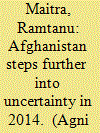

|
|
|
|
|
| Publication |
2014.
|
| Summary/Abstract |
2014 was long anticipated as the year of transition and ushering in of hope for Afghanistan. Three months of this important year are already behind us and, betraying earlier expectations, afghans continue to face stark uncertainties.
|
|
|
|
|
|
|
|
|
|
|
|
|
|
|
|
| 2 |
ID:
109041
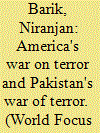

|
|
|
| 3 |
ID:
125356
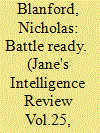

|
|
|
|
|
| Publication |
2013.
|
| Summary/Abstract |
As Hizbullah's fighting forces undergoes expansion, the number of its training facilities for urban operations is also increasing. Nicholas Blanford examines the group's use of these centres and the effect they are likely to have on its tactical capabilities.
|
|
|
|
|
|
|
|
|
|
|
|
|
|
|
|
| 4 |
ID:
095290
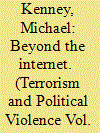

|
|
|
|
|
| Publication |
2010.
|
| Summary/Abstract |
This study challenges the conventional wisdom that the Internet is a reliable source of operational knowledge for terrorists, allowing them to train for terrorist attacks without access to real-world training camps and practical experience. The article distinguishes between abstract technical knowledge (what the Greeks called techne) and practical, experiential knowledge (mtis), investigating how each helps terrorists prepare for attacks. This distinction offers insight into how terrorists acquire the practical know-how they need to perform their activities as opposed to abstract know-what contained in bomb-making manuals. It also underscores the Internet's limitations as a source of operational knowledge for terrorists. While the Internet allows militants to share substantial techne, along with religious and ideological information, it is not particularly useful for disseminating the experiential and situational knowledge terrorists use to engage in acts of political violence. One likely reason why Al Qaeda and other Islamist terrorists have not made better use of the Internet's training potential to date is that its value as a source of operational knowledge of terrorism is limited.
|
|
|
|
|
|
|
|
|
|
|
|
|
|
|
|
| 5 |
ID:
091266
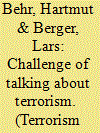

|
|
|
|
|
| Publication |
2009.
|
| Summary/Abstract |
The Arab "hegemonic debate" on the causes of Islamist terrorism nurtures (pan-) Arab, anti-Western sentiments and delegitimizes criticism of the political status quo. The European Union's emphasis on multilateral means of conflict resolution and trade promotion leads to official pronouncements that barely address the Arab world's domestic problems, instead referring to international tensions such as the Arab-Israeli conflict as a particular cause of Islamist terrorism and the need for cooperation with Arab governments. By failing to challenge the official narratives of authoritarian Arab regimes the EU obstructs interests in the democratization of the region and the delegitimization of Islamist violence.
|
|
|
|
|
|
|
|
|
|
|
|
|
|
|
|
| 6 |
ID:
130699
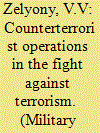

|
|
|
|
|
| Publication |
2014.
|
| Summary/Abstract |
With reference to special measures taken by the Israeli authorities, the author examines the nature and specific aspects of counterterrorist operations, suggest his own definition and develops a classification of the fight against terrorism.
|
|
|
|
|
|
|
|
|
|
|
|
|
|
|
|
| 7 |
ID:
124652
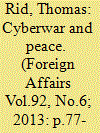

|
|
|
|
|
| Publication |
2013.
|
| Summary/Abstract |
Cyberwar Is Coming!" declared the title of a seminal 1993 article by the RAND Corporation analysts John Arquilla and David Ronfeldt, who argued that the nascent Internet would fundamentally transform warfare. The idea seemed fanciful at the time, and it took more than a decade for members of the U.S. national security establishment to catch on. But once they did, a chorus of voices resounded in the mass media, proclaiming the dawn of the era of cyberwar and warning of its terrifying potential. In February 2011, then CIA Director Leon Panetta warned Congress that "the next Pearl Harbor could very well be a cyberattack." And in late 2012, Mike McConnell, who had served as director of national intelligence under President George W. Bush, warned darkly that the United States could not "wait for the cyber equivalent of the collapse of the World Trade Centers."
|
|
|
|
|
|
|
|
|
|
|
|
|
|
|
|
| 8 |
ID:
171169
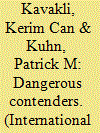

|
|
|
|
|
| Summary/Abstract |
How do international observers decide whether to criticize or condone electoral fraud in a country? We argue that this decision depends on the identity of the victims of electoral fraud. A monitoring organization is more likely to overlook fraud committed against groups that are deemed dangerous by its sponsor. Based on this insight, we hypothesize that in the post-Cold War era election monitors are more tolerant of fraud against Islamic challengers, especially when Islamic movements are perceived as a threat to political stability. In support of our hypothesis, we find that outside monitors are more likely to endorse an election in countries with an Islamic opposition party and an ongoing Islamist terrorist campaign. Furthermore, we find that the effect is driven by Western monitoring organizations and becomes stronger after the September 11 attacks. Our findings provide a simple yet powerful insight: the calculus of outside observers depends not only on who they wish to see in power, but also who they want to keep from power.
|
|
|
|
|
|
|
|
|
|
|
|
|
|
|
|
| 9 |
ID:
133094
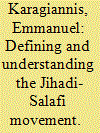

|
|
|
|
|
| Publication |
2014.
|
| Summary/Abstract |
Jihadi-Salafi groups have been on the march in the post-9/11 years on a violent campaign to achieve their ends. From North America to South-East Asia and from Europe to Sub-Saharan Africa, Jihadi-Salafis have attacked Western and local targets with often devastating results. Despite growing attention to the Jihadi-Salafi movement, which includes both globalized and localized components, there are still questions that remain largely unanswered. Three new books can shed light on this modern phenomenon that has preoccupied Western security policies for the past decade. Jihadi-Salafism is a large and diverse movement with a global reach that has embarked on an armed struggle to defend the imagined ummah.
|
|
|
|
|
|
|
|
|
|
|
|
|
|
|
|
| 10 |
ID:
133684
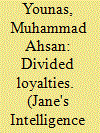

|
|
|
|
|
| Publication |
2014.
|
| Summary/Abstract |
The top leadership of the Jihadist militant organization Tehrik-e-Taliban Pakistan has fractured after months of infighting. Muhammad Ahsan Younas reviews the events that caused the group to fracture ant the implications for its future operations.
|
|
|
|
|
|
|
|
|
|
|
|
|
|
|
|
| 11 |
ID:
099791
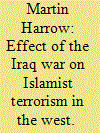

|
|
|
|
|
| Publication |
2010.
|
| Summary/Abstract |
This article investigates the effects of the Iraq war on terrorism in the West. Arguments from academics and from war-opponents and adherents are distilled into three hypotheses which are tested. To do this, a measure is created of terrorist activities in the West based on terrorist attacks and failed and foiled plots. The causal logic of the hypotheses is examined by piecing together data from various sources. Effects of the Iraq war are surprisingly hard to identify on terrorism in the West: It is difficult to corroborate that the Iraq war has drawn Islamist militant resources from the West, that Jihadist returnees should pose a significant threat, or that Muslims in greater numbers have been mobilized to terrorism. This does not disqualify transnational dynamics! Rather, it exemplifies how transnational dynamics in terrorism connects some parts of the globe, but not all, and not necessarily those most globalized. Immaterial factors, such as tactics from Iraq, have not been relevant in the West, but have had an effect in Afghanistan. Material factors like the return of Jihadists have not permeated to the West, but have had an effect in neighbouring countries.
|
|
|
|
|
|
|
|
|
|
|
|
|
|
|
|
| 12 |
ID:
092466
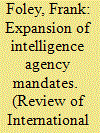

|
|
|
|
|
| Publication |
2009.
|
| Summary/Abstract |
The UK's domestic intelligence agency, MI5, has become increasingly involved in the realm of law enforcement over the last decade. This article puts the British experience in perspective by comparing it with France's main domestic intelligence agency, which has pushed deep into the law enforcement arena in recent years. A similar perception of Islamist terrorism underpins these parallel developments in the two countries. However, differences relating to accountability, legal systems and conceptions of the state mean that the French intelligence agency has expanded its role considerably more than its British counterpart. The analysis indicates that MI5's move into law enforcement is likely to remain a relatively conservative one.
|
|
|
|
|
|
|
|
|
|
|
|
|
|
|
|
| 13 |
ID:
131983
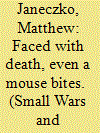

|
|
|
|
|
| Publication |
2014.
|
| Summary/Abstract |
This article analyzes the motivations behind individuals who chose to adopt terrorist methods in the Chechen conflicts of the late 1990s and early 2000s. While the seemingly obvious motivation in joining in a 'religious' war of jihad would be a strong belief in that religion, the reality is more complicated. The motivations behind these individuals were not only religious, but cultural, social, and political. This indicates that while the methods and ideological rhetoric adopted by Chechen terrorists prove similar to methods adopted by terrorists across the world, the fundamental causes and drive behind these terrorists are actually quite distinct and unique from others.
|
|
|
|
|
|
|
|
|
|
|
|
|
|
|
|
| 14 |
ID:
105088


|
|
|
|
|
| Publication |
2011.
|
| Summary/Abstract |
Felani wore her gold bridal jewelry as she crouched out of sight inside the squalid concrete building. The 15-year-old's father, Nurul Islam, peeked cautiously out the window and scanned the steel and barbed-wire fence that demarcates the border between India and Bangladesh. The fence was the last obstacle to Felani's wedding, arranged for a week later in her family's ancestral village just across the border in Bangladesh.
|
|
|
|
|
|
|
|
|
|
|
|
|
|
|
|
| 15 |
ID:
170795
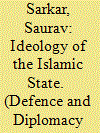

|
|
|
|
|
| Summary/Abstract |
The Islamic State (IS) terror group continues to operate and endure
five years after its founding in 2014 and after the loss of its caliphate in
March this year. The IS has also endured the killings of its Caliph Abu
Bakr al-Baghdadi in October and other senior leaders in the last few
years. A factor in the resilience of the IS is the nature of its organisational
structure – which is quite ambiguous, with no clear hierarchy – that is
not severely affected by leadership decapitations or territorial losses.
However, a larger force behind its survival is its ideological appeal and
emphasis on using violence to achieve its ends. The IS has invested a
lot of resources and expertise in propagating and micromanaging its
ideological message across the jihadist landscape. The ideology of the
IS – a mix of Salafi-jihadism, Sunni extremism and a nihilistic outlook
– has found resonance among radical sympathisers worldwide and
had managed to bridge the gap between jihadist thought and action by
establishing a functioning Islamic caliphate in 2014, something that no
other Islamist terror group had been able to do
|
|
|
|
|
|
|
|
|
|
|
|
|
|
|
|
| 16 |
ID:
137482
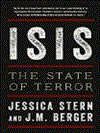

|
|
|
|
|
| Publication |
London, William Collins, 2015.
|
| Description |
xxii, 385p.Pbk.
|
| Standard Number |
9780008133610
|
|
|
|
|
|
|
|
|
|
|
|
Copies: C:1/I:0,R:0,Q:0
Circulation
| Accession# | Call# | Current Location | Status | Policy | Location |
| 058168 | 303.625/STE 058168 | Main | On Shelf | General | |
|
|
|
|
| 17 |
ID:
146756
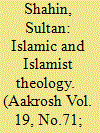

|
|
|
| 18 |
ID:
128089
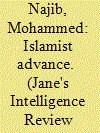

|
|
|
|
|
| Publication |
2012.
|
| Summary/Abstract |
With its strong focus on nationalism, the militant Islamism group has become a major challenger to Hamas's authority in the Gaza Strip. Mohammed Najib examines the rise of Palestine Islamist Jihad and its armed wing that has links to Syria and Iran
|
|
|
|
|
|
|
|
|
|
|
|
|
|
|
|
| 19 |
ID:
172169
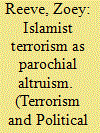

|
|
|
|
|
| Summary/Abstract |
An evolutionary approach is used to explain how certain universal cognitive mechanisms (parochial altruism) underlie engagement and involvement in Islamist terrorism. Parochial altruism is the tendency to perceive and behave in ways that favour ingroups and disfavour outgroups in light of particular intergroup cues, whilst incurring some kind of personal cost to effect that bias. The parochial altruism mechanism influences how ingroups and outgroups are perceived (i.e., as threatened or threatening) and responded to. Experience of certain situations and/or dispositions (i.e., priming contexts of disease, and harm to the ingroup) make parochial altruistic responses more likely. It is argued that Islamist terrorist grievances can be considered as perceptions of evolutionarily relevant threats, whilst terrorism itself is an example of parochial altruistic behaviour. It is further proposed that features associated with engagement in terrorism (including exposure to ideology, propaganda, socialisation, etc.) enhance and guide parochial altruism, that is, perceptions of intergroup threat, and violent responses to it.
|
|
|
|
|
|
|
|
|
|
|
|
|
|
|
|
| 20 |
ID:
132826
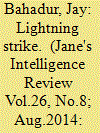

|
|
|
|
|
| Publication |
2014.
|
| Summary/Abstract |
A suicide attack at a restaurant in Djibouti showed Harakat-Al-Shabaab Al-Mujahideen's continued ability to launch cross border militant attacks. Jay Bahadur consider whether Ethiopia will be the Islamist extremist group's next target.
|
|
|
|
|
|
|
|
|
|
|
|
|
|
|
|
|
|
|
|
|